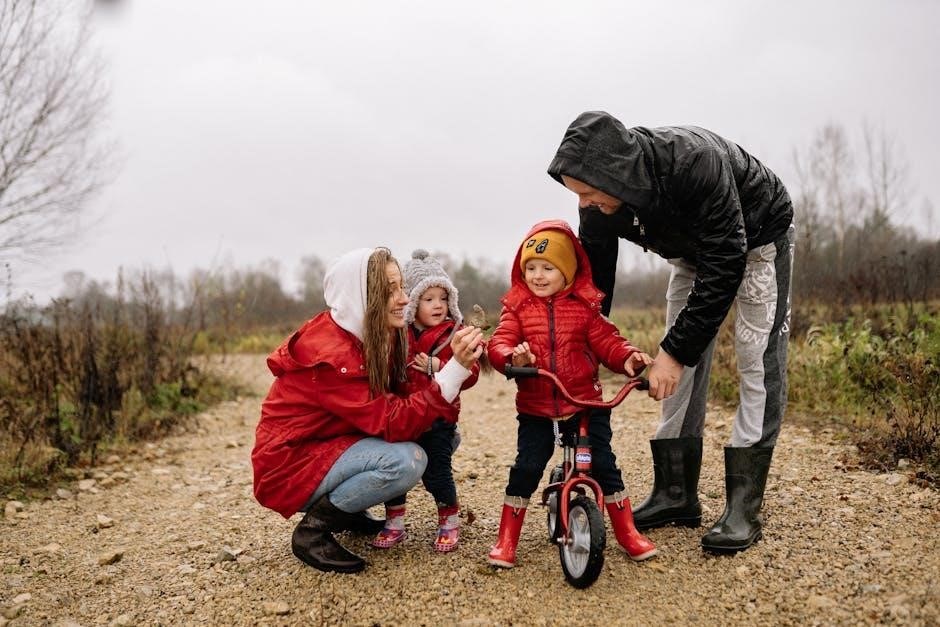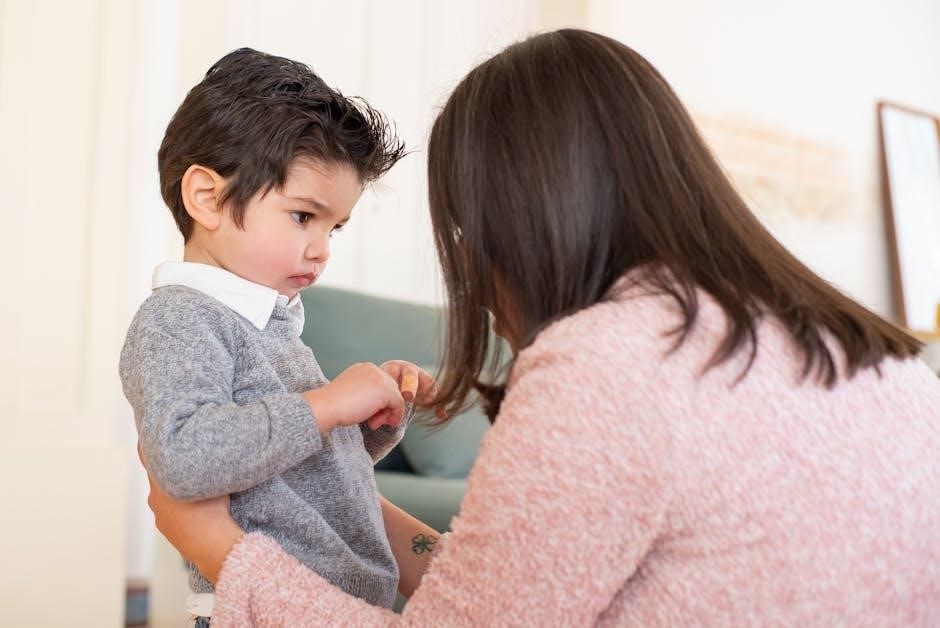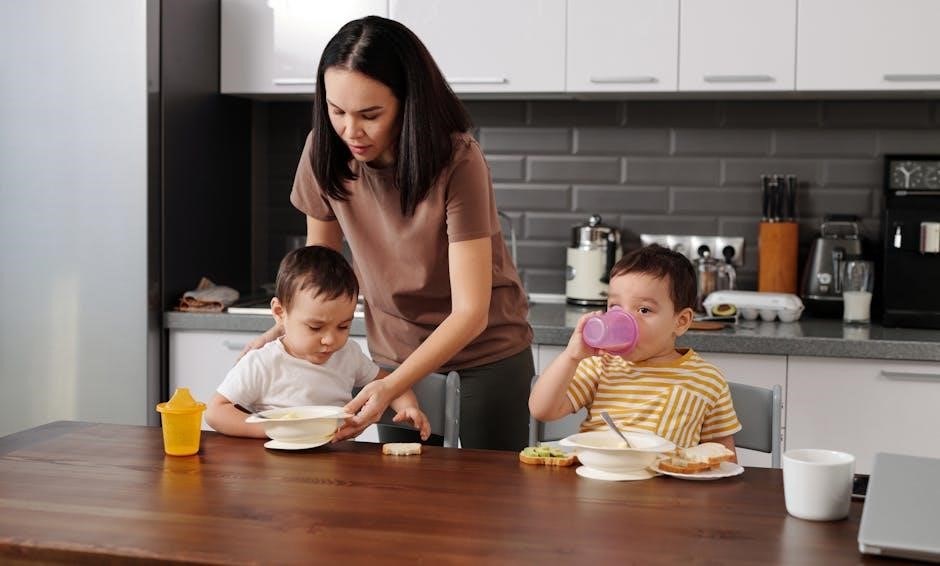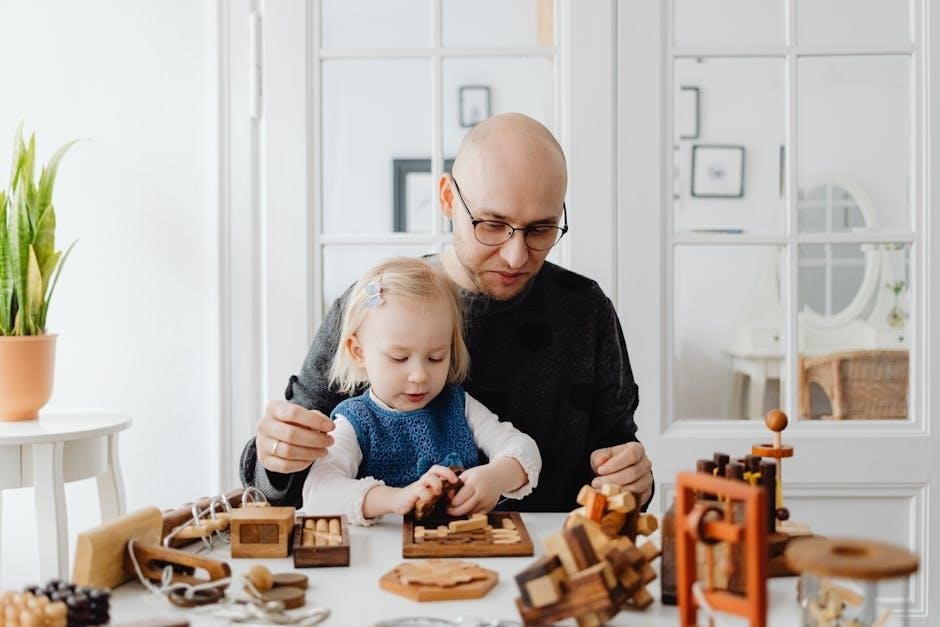
Talking with your toddler is crucial for their development, as seen in the book published in 2016, which provides a guide to language development and fun activities for parents and toddlers alike naturally every day.
Understanding the Importance of Communication
Communication is key to a toddler’s development, and talking with them is essential for their growth. According to experts, the more you talk to your baby, the more they will learn, and this learning process starts from a very young age. Parents often underestimate the importance of communication, but it plays a vital role in shaping their child’s future. Effective communication helps in building a strong bond between the parent and the child, and it also helps in developing the child’s language skills. The book “Talking with Your Toddler” provides valuable insights into the importance of communication and offers practical tips for parents to improve their communication skills. By understanding the importance of communication, parents can help their toddlers develop into confident and expressive individuals. This, in turn, can have a positive impact on their social and emotional development, and can also help them to succeed in their future endeavors.
Benefits of Talking to Your Toddler
Talking to your toddler has numerous benefits, including promoting language learning and supporting social and emotional development. The more you talk to your baby, the more they will learn, and this learning process can have a lasting impact on their future. Talking to your toddler can also help to create a loving and cooperative relationship between the parent and the child. Additionally, it can help to develop the child’s thinking skills, as they learn to express their thoughts and ideas. By talking to your toddler, you can also help them to develop their problem-solving skills, as they learn to navigate their surroundings and make sense of the world around them. Overall, talking to your toddler is essential for their overall development, and it can have a positive impact on their future success. This is why it is so important for parents to make talking to their toddler a priority, and to engage in conversations with them regularly.

Language Development in Toddlers
Language development in toddlers is a complex process involving cognitive skills and social interactions naturally every single day with parents and caregivers always.
How Talking Promotes Language Learning
Talking promotes language learning in toddlers by exposing them to various words, phrases, and sentences, which helps them develop their vocabulary and understanding of language structures. This process begins from birth, and the more parents talk to their children, the more they learn. According to research, talking to toddlers is essential for their language development, as it provides them with the opportunity to hear and imitate different sounds, words, and phrases. Parents can promote language learning by engaging in conversations with their toddlers, reading books, singing songs, and reciting nursery rhymes. These activities help toddlers develop their language skills, including listening, speaking, reading, and writing. By talking to their toddlers regularly, parents can help them build a strong foundation in language, which is essential for their future academic and social success. Talking to toddlers also helps them develop their critical thinking skills and learn how to express themselves effectively.
Supporting Social and Emotional Development
Talking with toddlers supports their social and emotional development by helping them understand and manage their emotions, develop empathy, and build strong relationships with others. Through conversations, parents can help their toddlers identify and label their emotions, which is essential for developing emotional intelligence. Talking also helps toddlers develop social skills, such as sharing, taking turns, and cooperating with others. By engaging in conversations with their toddlers, parents can model healthy communication skills, such as active listening, expressing feelings, and resolving conflicts. This helps toddlers develop a sense of security and trust, which is critical for their social and emotional development. Additionally, talking with toddlers helps them develop self-awareness, self-regulation, and self-motivation, which are essential for their future social and emotional success. By talking with their toddlers regularly, parents can help them develop into confident, empathetic, and socially skilled individuals. Effective communication is key to supporting social and emotional development in toddlers.

Effective Communication Techniques
Parents use various techniques like self-talk and parallel-talk to communicate with toddlers and enhance their language skills naturally every single day with fun activities and conversations at home.
Using Self-Talk to Describe Your Actions
Using self-talk to describe your actions is an effective way to communicate with your toddler, as it helps them understand what you are doing and why. This technique involves describing your actions, thoughts, and feelings out loud, allowing your toddler to learn from your experiences. For example, you can say “I am washing the dishes” or “I am feeling happy today”. This helps your toddler develop their language skills and understand the world around them. By using self-talk, you can also encourage your toddler to imitate you and start using language to communicate their own thoughts and feelings. Additionally, self-talk can help your toddler develop their social and emotional skills, such as empathy and self-awareness. Overall, using self-talk to describe your actions is a simple yet powerful way to promote language development and communication with your toddler. It is a technique that can be used in everyday activities, making it a great way to engage with your child.
Using Parallel-Talk to Describe Your Child’s Actions
Using parallel-talk to describe your child’s actions is a valuable technique for promoting language development in toddlers. This involves describing what your child is doing, seeing, or feeling, in a narrative style. For example, if your child is playing with blocks, you can say “you’re building a tower” or “you’re stacking the blocks high”. This helps your child develop their language skills and understand the connection between words and actions. By using parallel-talk, you can also encourage your child to engage in conversation and respond to your descriptions. Additionally, parallel-talk can help your child develop their problem-solving skills and hand-eye coordination. It’s essential to use simple and clear language when using parallel-talk, making it easy for your child to understand and follow. By incorporating parallel-talk into your daily interactions, you can create a supportive and engaging environment that fosters language development and learning in your toddler. This technique can be used in various situations, making it a versatile tool for parents and caregivers.

Engaging Your Toddler in Conversation
Engaging your toddler in conversation helps develop language skills and builds a strong relationship naturally through daily interactions and activities with parents and caregivers every single day always.
Asking Open-Ended Questions to Encourage Thinking
Asking open-ended questions is a great way to encourage thinking and language development in toddlers, as seen in the book Talking with Your Toddler, which provides guidance on how to do this effectively.
According to Dr. Talley, children at this age love to talk about their favorites, such as their favorite flavor of ice cream or favorite movie.
Parents can go deeper by asking why something is their child’s favorite, which helps to get them thinking about their likes and dislikes.
This type of questioning helps to develop critical thinking skills and can deepen the connection between parent and child.
By asking open-ended questions, parents can help their toddlers develop a love for learning and exploration, which can benefit them throughout their lives.
It’s a simple yet effective way to encourage thinking and language development, and can be done through daily conversations and interactions.
Asking open-ended questions is an essential part of talking with your toddler and can have a lasting impact on their cognitive and social development.

Sharing Your Own Experiences to Deepen Connection
Sharing your own experiences with your toddler is a great way to deepen your connection and create a sense of mutual understanding, as discussed in the book Talking with Your Toddler.
By sharing your favorite items or experiences, you can help your toddler feel more comfortable opening up to you about their own thoughts and feelings.
This can be as simple as talking about your favorite food or hobby, and asking your toddler to share theirs.
Sharing your own experiences can also help your toddler develop empathy and understanding of other people’s perspectives.
According to the book, sharing your own experiences can help create a loving and cooperative relationship with your toddler.
It’s a way to show your toddler that you value and respect their thoughts and feelings, and can help to strengthen your bond.
By sharing your own experiences, you can create a sense of trust and openness with your toddler, which is essential for healthy communication and development.
This can have a lasting impact on your relationship with your toddler and can help them develop important social and emotional skills.